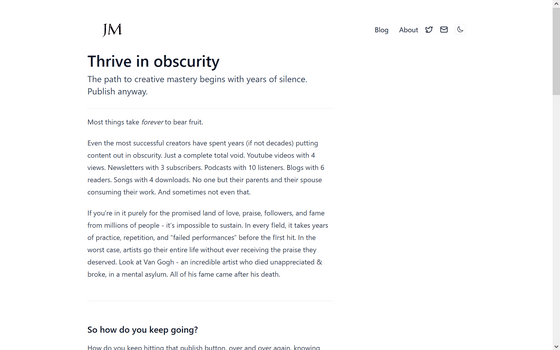The mindset you need to keep creating even if no one responds to your work after you publish it

As the saying goes, 'persistence is power,' and it is often said that it is important to keep creating, even if your work is ignored at first. That being said, it is sad when no one notices your work. Jeet Mehta, who developed the sports app '
Thrive in obscurity
https://www.jeetmehta.com/posts/thrive-in-obscurity

'Most things take time to bear fruit,' Mehta writes, noting that even the most successful creators have churned out content in obscurity for years, if not decades: a YouTube video with four views, a newsletter with three subscribers, a podcast with 10 listeners, a blog with six readers, to name a few.
As advice for continuing in these circumstances, Mehta offers the following three pillars:
◆1: If you do what you love, the world may agree with you
In

◆2: Push yourself out
It's similar to Mike Posner's philosophy: make what you love, rather than trying to figure out what your audience likes. Mehta explains, 'This will help you stay motivated even when there isn't an audience. It will help you get through plateaus, you'll enjoy the process, you'll produce better work, and best of all, you'll attract like-minded followers - people who love the work you love to make.'
3. Create a space for your work
Mehta points out that it is also important to have a list of works and create a space where people can learn about and comment on them. Such spaces are also called 'Binge Banks,' and the idea that creators with a certain number of works should create them is a hot topic. Even if you don't have fans now, if you have fans in the future, they will want to see all the works that you have created. Mehta writes, 'If you look at YouTubers with millions of subscribers, even the first videos you post may be viewed a lot. These were never viewed from the beginning, but by fans you gained later.'

Regarding these three pillars, on the social site Hacker News, comments were exchanged such as, 'It's true that when I stopped striving for fame and continued doing what I loved, I was much happier. But it's important to recognize that this sense of security only came after I had earned enough money that I didn't have to think about a side job. Doing what you love seems like a luxury for people who aren't worried about paying the bills.' In response to this comment , others said , 'But if you're not enjoying your work at all, it probably won't work. Pick something you love that someone will pay you for,' and 'I started recording random niche things that there isn't much information about anywhere else on the internet. They may seem insignificant at first glance, but in life and work, everyone wants to know about them . That makes the few connections I make through my site that much more special.'
'If you're looking for the promised land of love, admiration, followers, and fame from millions of people, it's impossible to sustain it,' Mehta wrote. 'In any field, it takes years of practice, repetition, and failure before you get your first hit. In the worst cases, artists go their whole lives without ever receiving the acclaim they deserve. Take Van Gogh for example. If you're stuck working in obscurity (like me), this should be a gentle reminder to you. Keep going.'
Related Posts:
in Posted by log1p_kr







